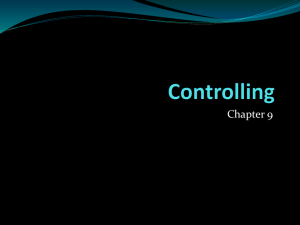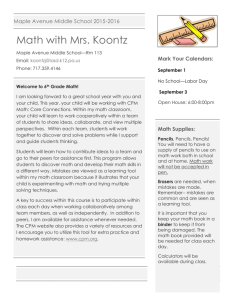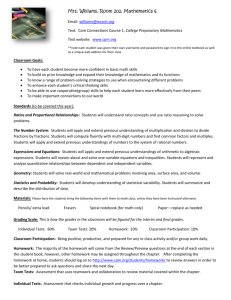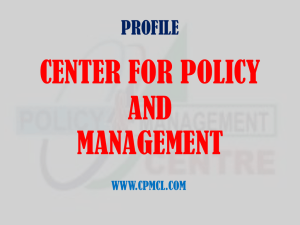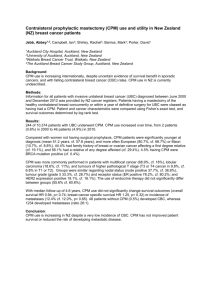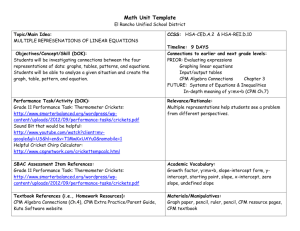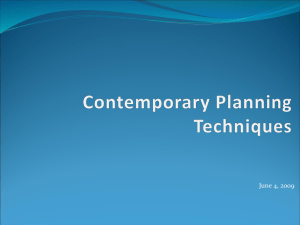Management Development Planning Workshop
advertisement
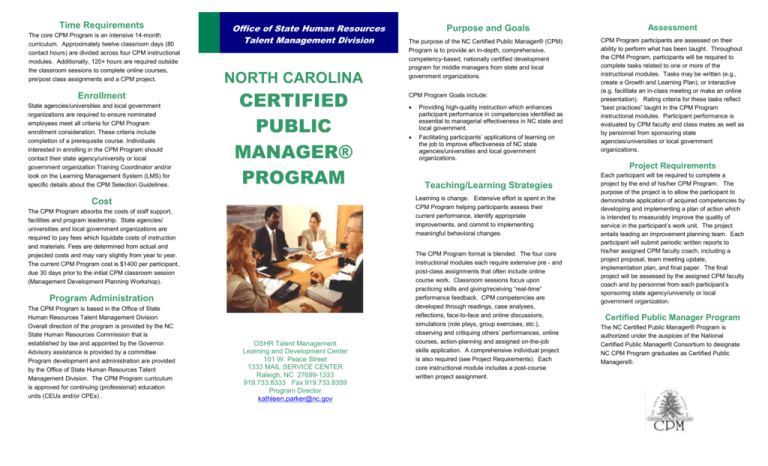
Time Requirements The core CPM Program is an intensive 14-month curriculum. Approximately twelve classroom days (80 contact hours) are divided across four CPM instructional modules. Additionally, 120+ hours are required outside the classroom sessions to complete online courses, pre/post class assignments and a CPM project. Enrollment State agencies/universities and local government organizations are required to ensure nominated employees meet all criteria for CPM Program enrollment consideration. These criteria include completion of a prerequisite course. Individuals interested in enrolling in the CPM Program should contact their state agency/university or local government organization Training Coordinator and/or look on the Learning Management System (LMS) for specific details about the CPM Selection Guidelines. Office of State Human Resources Talent Management Division NORTH CAROLINA CERTIFIED PUBLIC MANAGER® PROGRAM The purpose of the NC Certified Public Manager® (CPM) Program is to provide an in-depth, comprehensive, competency-based, nationally certified development program for middle managers from state and local government organizations. CPM Program Goals include: Providing high-quality instruction which enhances participant performance in competencies identified as essential to managerial effectiveness in NC state and local government. Facilitating participants’ applications of learning on the job to improve effectiveness of NC state agencies/universities and local government organizations. The CPM Program absorbs the costs of staff support, facilities and program leadership. State agencies/ universities and local government organizations are required to pay fees which liquidate costs of instruction and materials. Fees are determined from actual and projected costs and may vary slightly from year to year. The current CPM Program cost is $1400 per participant, due 30 days prior to the initial CPM classroom session (Management Development Planning Workshop). Program Administration OSHR Talent Management Learning and Development Center 101 W. Peace Street 1333 MAIL SERVICE CENTER Raleigh, NC 27699-1333 919.733.8333 Fax 919.733.8359 Program Director kathleen.parker@nc.gov Assessment CPM Program participants are assessed on their ability to perform what has been taught. Throughout the CPM Program, participants will be required to complete tasks related to one or more of the instructional modules. Tasks may be written (e.g., create a Growth and Learning Plan), or interactive (e.g. facilitate an in-class meeting or make an online presentation). Rating criteria for these tasks reflect “best practices” taught in the CPM Program instructional modules. Participant performance is evaluated by CPM faculty and class mates as well as by personnel from sponsoring state agencies/universities or local government organizations. Project Requirements Teaching/Learning Strategies Learning is change. Extensive effort is spent in the CPM Program helping participants assess their current performance, identify appropriate improvements, and commit to implementing meaningful behavioral changes. Cost The CPM Program is based in the Office of State Human Resources Talent Management Division. Overall direction of the program is provided by the NC State Human Resources Commission that is established by law and appointed by the Governor. Advisory assistance is provided by a committee. Program development and administration are provided by the Office of State Human Resources Talent Management Division. The CPM Program curriculum is approved for continuing (professional) education units (CEUs and/or CPEs) . Purpose and Goals The CPM Program format is blended. The four core instructional modules each require extensive pre - and post-class assignments that often include online course work. Classroom sessions focus upon practicing skills and giving/receiving “real-time” performance feedback. CPM competencies are developed through readings, case analyses, reflections, face-to-face and online discussions, simulations (role plays, group exercises, etc.), observing and critiquing others’ performances, online courses, action-planning and assigned on-the-job skills application. A comprehensive individual project is also required (see Project Requirements). Each core instructional module includes a post-course written project assignment. Each participant will be required to complete a project by the end of his/her CPM Program. The purpose of the project is to allow the participant to demonstrate application of acquired competencies by developing and implementing a plan of action which is intended to measurably improve the quality of service in the participant’s work unit. The project entails leading an improvement planning team. Each participant will submit periodic written reports to his/her assigned CPM faculty coach, including a project proposal, team meeting update, implementation plan, and final paper. The final project will be assessed by the assigned CPM faculty coach and by personnel from each participant’s sponsoring state agency/university or local government organization. Certified Public Manager Program The NC Certified Public Manager® Program is authorized under the auspices of the National Certified Public Manager® Consortium to designate NC CPM Program graduates as Certified Public Managers®. North Carolina Certified Public Manager® Program CPM Competencies Personal and Organizational Integrity Modeling and reinforcing behaviors that address potential ethical problems; appropriate workplace behavior; legal and policy compliance. Managing Work Meeting organizational goals through effective planning, prioritizing, organization and alignment of human, financial, material and information resources. Empowering others by delegating clear job expectations; providing meaningful feedback and coaching; measuring performance. Leading People Inspiring others to positive action through a clear vision; developing a diverse workforce; fostering commitment and team spirit; effectively managing emotions and impulses. Developing Self Demonstrating commitment to continuous learning, self-awareness and individual performance planning through feedback, analysis and action. Systemic Integration Approaching planning, decision-making and implementation from an enterprise perspective; understanding internal and external relationships that impact the organization. Public Service Focus Delivering superior services to the public and internal and external recipients; identifying customer/client expectations and implementing processes that result in quality service. Change Leadership Initiating and supporting change within the organization by implementing strategies to help others adapt to changes in the work environment; fostering creativity and innovation; being proactive. Curriculum The CPM Program curriculum consists of the following four core instructional modules (not including prerequisite or co-requisite courses). Each module is delivered in a 2-1/2 to 3 day classroom session supported by extensive pre- and post- class assignments. Significant online course work and an intensive individual project are required. Management Development Planning Workshop Describe key behaviors associated with each of the seven CPM competencies. Practice giving and receiving performance-based feedback. For each CPM competency, use assessment center data to identify individual baseline performance levels. Create an individual Growth and Learning Plan that includes 12-month improvement goals, action steps, performance measures, resource requirements, timelines and results. 20+ hours of related pre and post class assignments. Pre-class assignments include written exercises and competency-based 360° performance survey data. Post-class assignments feature online courses, Live Online discussions, Discussion Board posts, and an individual two-hour feedback and planning session with a CPM faculty coach followed by the subsequent submission of an individual written Growth and Learning plan. Managing Daily Operations Strategic Leadership Better manage daily operations by honing skills associated with the CPM competencies of Managing Work, Leading People, and maintaining a Public Service Focus. Select and apply problem solving and process improvement approaches, tools and techniques to assess the effectiveness of public sector programs, processes, policies and organizations. Plan and launch a project which addresses solving a problem, improving a process or program, or initiating a new program, with emphasis upon effective data/measurement, team work, implementation strategies and change management. Improve individual leadership performance in the work place through application of five Leadership Challenge practices and ten commitments based upon the research of Kouzes and Posner. Describe effective change management strategies, and compare practices in their state and local government agencies and universities to those best practices. Apply effective business execution and monitoring/evaluation tools in the context of their CPM project. Use best practices to create organizational cultures and structures that support high performing organizations. 40+ hours of related pre and post class assignments. Pre-class assignments include online courses, selfaudit of managerial activities, case analysis and project exploration. Post-class assignments consist of additional online course work, Live Online meetings, Discussion Board posts, and a written project proposal. Interacting at All Levels Engage effectively in interpersonal interactions by applying communication and problem-solving skills. Use collaborative conflict management strategies to achieve mutual benefit while getting organizational results. Select, develop, lead and facilitate effective teams. Run productive meetings using best practices including appropriate technologies. Prepare and deliver formal informative and/or persuasive presentations. 40+ hours of related pre and post class assignments. Pre-class assignments include readings, interaction questionnaires, online courses, Live Online discussions and Discussion Board posts. Post-class assignments include a written team meeting update, online courses, Discussion Board entries, delivery of an individual online presentation, and a written project team update. 20+ hours of related pre and post class assignments. Pre-class assignments include online courses, Discussion Board posts, and a written project implementation plan. Postclass assignments include online courses, Discussion Board posts, completion and submission of the final project paper, and online project reviews by team members and agency personnel. The completed Growth and Learning plan that documents performance results for individual development efforts is also submitted.
